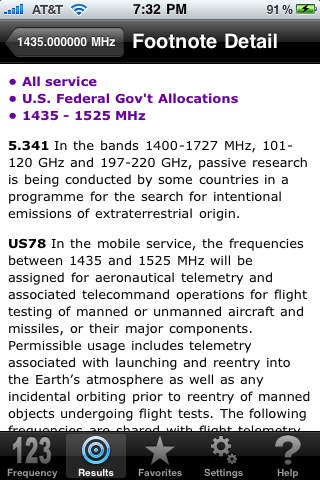
Allocations app for iPhone and iPad
Developer: LoveMyTech
First release : 18 Dec 2009
App size: 1.01 Mb
Allocations...the entire Table of Frequency Allocations at your fingertips!
--> v1.0.8 is now current to the January 25, 2010 FCC update. <--
Allocations is your pocket guide to radio frequency spectrum allocations for the iPhone and iPod touch. With built-in spectrum allocation data, the entire Table of Frequency Allocations, with footnotes, is available for query even when offline. No more flipping back-and-forth through 150+ pages of the allocation table to gather the information you need.
Features:
- Radio spectrum allocations for the United States (Federal and non-Federal) and all three ITU Regions.
- Not just a re-format of the FCC tables, but a tool that allows you to see ONLY the information relevant to the frequency of interest.
- Covers all allocated frequency bands (9 kHz - 275 GHz).
- Displays primary and secondary allocations.
- Includes full text of all relevant footnotes for each band.
- Fully functional without a network connection.
- Supports iPhone and iPod touch.
- Free updates when the FCC allocation table is updated.
- Written by and for telecommunications professionals.
Allocations is a useful reference for anyone interested in radio communications, including spectrum managers, regulators, broadcasters, consultants, attorneys, economists, engineers, amateur radio operators, shortwave and scanner listeners, and others.
The source allocation data are derived from the latest FCC allocation table document, which is presently the January 25, 2010 version. The FCC publishes an updated document every few months, and Allocations will be updated accordingly. Existing users receive free updates.
Disclaimer: While the database contained in Allocations is believed to be accurate, the official Table of Frequency Allocations for the United States is the version published in the Federal Register. For critical purposes, the user is advised to consult the primary source material.



